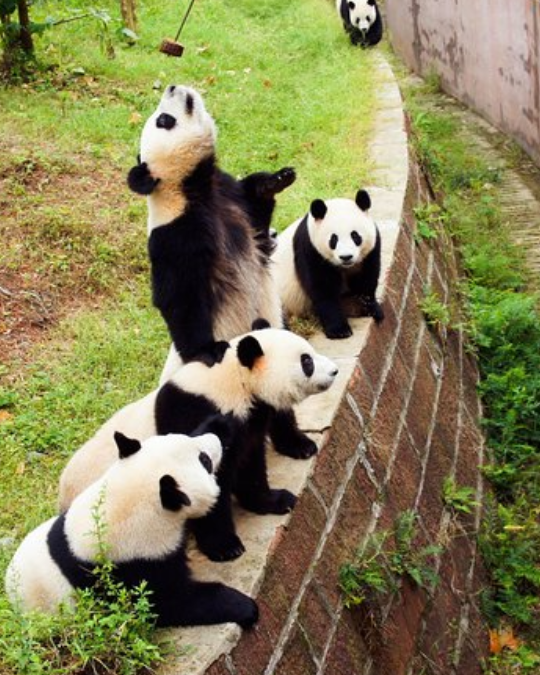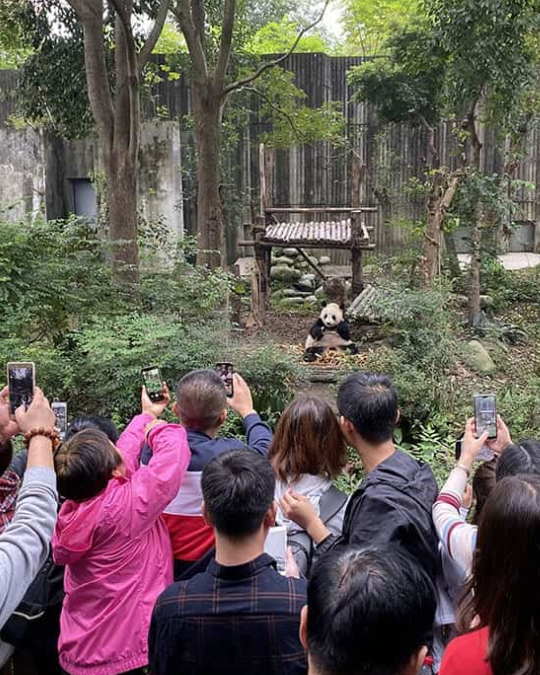Whether you’re a wildlife lover or a panda admirer, a trip to the Chengdu Giant Panda Breeding Research Base is guaranteed to impress. This world-famous facility, located in the heart of Sichuan, China, works towards the conservation and research of giant pandas and other endangered species. From offering in-depth insights about the ticketing process to suggesting tips and tricks to help users navigate the complex, this blog post covers it all. We will also highlight the best locations and times to visit the base. No matter if it’s a family trip or a solo excursion, use this article to ensure your visit to the Chengdu base is unforgettable.
What is the Chengdu Panda Base?

What is the Chengdu Panda Base
Chengdu Research Base of Giant Panda Breeding, or simply Chengdu Panda Base, is a famous conservation center in Chengdu, China. It was founded in 1987 with the intent of conserving and breeding giant pandas along with researching their ecology and behavior. The base is also a sight for the preservation of some other endangered species and acts as an education and awareness center for wildlife conservation efforts. The base also provides visitors with a stunning natural environment to capture close auspicious views of pandas while contributing to ongoing conservation which is rather persuasive.
Understanding the Giant Panda Breeding Research Base
Located in Chengdu, China, the Giant Panda Breeding Research Base has established itself as one of the world’s leading facilities in panda captive breeding, conservation and research. Its 247-acre size replicates the panda’s natural habitat, creating ideal conditions for breeding, research, and care. Since the establishment of the base in 1987, hundreds of successful births aided in increasing the panda’s population.
The research base is home to a surgical ward, a panda nursery, a veterinary clinic, a lab and a breeding center. The base collaborates with various conservation organizations to improve the survival chances of pandas. The pandas fed at the base are given a nutritionally balanced diet consisting of 20 kg (44 lbs) of bamboo daily, along with carrots, bamboo shoots, and specially made biscuits designed with panda nutritional needs in mind.
The facility serves not only as a conservation site but as a tourist destination, attracting millions of tourists every year. Visitors partake in guided tours and observe pandas of different ages, learning the importance of their conservation. The Giant Panda Breeding Research Base aims to advocate international efforts in conservation, showcasing what can be achieved with dedication and cooperation.
The History and Mission of the Chengdu Research Base of Giant Panda
The Chengdu Research Base of Giant Panda was initiated in 1987 to preserve and protect giant pandas as well as their habitat. The base began with six rescued pandas and, over the years, has developed significantly due to its research, breeding, and public education programs. From the beginning, our objectives have facilitated the scientific understanding of giant pandas and increased global awareness for the species as well as helped rehabilitate panda populations in the wilderness. With passion and effort, we proudly stand a leader among conservation initiatives aimed at protecting this species for many years to come.
Why Visit the Chengdu Panda Base?
With a visit to the Chengdu Panda Base, people can experience an animal-viewing encounter like no other while contributing to impactful conservation efforts. We provide an educational opportunity where you can watch pandas, from infant cubs to fully grown adults, in habitats that closely resemble their natural environment. In addition to seeing these animals, you will also actively contribute to our efforts in conserving and rehabilitating the panda population. A visit offers an unparalleled way to experience nature and help protect one of the most amazing animals in the world.
How to Book Chengdu Panda Base Tickets?

How to Book Chengdu Panda Base Tickets
Getting tickets for Chengdu Panda Base is easy and organized to guarantee a great experience. Tourists can obtain tickets by using the official Chengdu Panda Base website or other traveling pages that can be trusted. A reservation in advance is highly suitable at the peak of tourist season because tickets sell out fast. When tickets are booked, a confirmation code or ticket is issued that serves as proof for entry. Also, some platforms let you buy guided tours or transportation packages for convenience.
Online Booking for Panda Breeding Research Base Tickets
- How can I reserve tickets for the Chengdu Panda Base?
Tickets can be reserved online through the official Chengdu Panda Base website or trusted travel platforms. Ensure to book in advance during peak seasons to secure your spot.
- What information do I need for online booking?
You will typically need the following:
- Visitor’s full name
- Passport or government-issued ID details
- Number of tickets required
- Desired date and time of visit
- What is the price of tickets?
The price may vary depending on the platform, visitor type (adult, child, senior), or additional services. Check the official website for the latest pricing.
- When should I book my tickets?
It is recommended to book tickets at least 5–7 days in advance during peak seasons (holidays, summers) to avoid unavailability.
- What is the ticket confirmation process?
Upon booking, you will receive a ticket or confirmation code via email or platform notification. Ensure you provide accurate contact details.
Technical Parameters for Online Booking Systems:
- Payment Methods Supported: Credit/Debit Cards, PayPal, WeChat Pay, and AliPay.
- System Availability: 24/7 online access for booking.
- Cancelation Policy: Ability to cancel or modify reservations up to 24–48 hours prior to the scheduled visit.
- Mobile Accessibility: Fully functional mobile-friendly booking site or dedicated app support.
Ticket Prices and Admission Information
Like any other product or service, the price of tickets will differ depending on purpose and audience. Fees range from 20 to 30 dollars for adult general admission, and children, students, and seniors often get reduced rates ranging from 10 to 20 dollars. In addition, some venues provide family or group rates, which are more economical for large audiences. Some locations have certain days where they offer free admission or off-peak hours where the price is reduced. Also, advanced online bookings may include exclusive offers like skip-the-line or smoother experiences. For the most precise pricing information, always check the venue’s website directly.
Special Offers and Guided Tours
For my top three sites, I found that a lot of attractions seem to have special deals that are quite attractive. Seniors, families, and large groups often get discounts at certain venues – in fact, some places provide free or reduced admission on certain days. Furthermore, online booking often comes with benefits such as skip-the-line privileges or special rates. Guided tours are popular in many venues – usually at an additional cost – and they differ from standard group tours to fully private bespoke experiences. The venue’s official website is the most reliable source for the latest and most precise information on special deals and tour options.
What to Expect During Your Visit?

What to Expect During Your Visit
When you come to visit, you will be welcomed by young and mature pandas roaming about in their naturalistic enclosures. The research base allows for observation of the pandas whilst they eat, play, and nap, all the while learning about conservation through the exhibits and educative programs. The grounds are scenic and lush and allow for other wildlife to roam, as well as pandas, providing well-kept walking paths for visitors. Expect to do some walking and consider arriving early during the day to steer clear of crowds, in addition to seeing the pandas most active.
Exploring the Panda Museum
Offering a blend of fun and learning, The Panda Museum details the history, biology, and cultural significance of giant pandas. Visitors can learn about the unique features of pandas such as the bamboo pseudothumb which they use for grasping food and explore their evolutionary history in great detail. The museum explains the factors affecting panda’s survival in the wild like loss of habitat and low birth rates, alongside conservation efforts being made around the world.
Key exhibits range from life-sized panda replicas and multimedia presentations on scientific research and panda habitat preservation to real panda skeletal displays. Guests can try and understand the vocalizations of pandas or try and navigate through bamboo forests in the interactive sections of the museum. Artifacts and records depicting the bond between pandas and Chinese culture are also exhibited.
The facility utilizes automated climate simulation technology to build panda habitats, and 4K powered audio-visual projectors to showcase educational documentaries. These modern technologies are maintained to allow for clarity and immersive experiences. Live sessions addressing current research on panda preservation are also hosted by the staff, building awareness among the public.
Panda Viewing: Get Up Close to the Adorable Pandas
During your visit to the facility, you will be able to observe the pandas up close but from a safe distance. The facilities’ viewing areas are purposefully positioned to guarantee that visitors can see these gentle herbivores as they eat, interact, and even play in an enclosure that mimics their natural habitat. The enclosures are specially designed with glass panels that offer unobstructed views without any glare, while the temperature of the room is controlled to help the pandas feel comfortable. To enhance the experience, visitors are asked to keep the noise to a minimum and adhere to the pandas’ caretaker’s instructions so that the pandas are not disturbed during the visit.
Day Trips and Tours in Chengdu
Chengdu is famous for offering cultural and nature-rich day trips and tours that are educational and fun. They include a guided tour to the Leshan Giant Buddha, which is a UNESCO World Heritage Site, that usually lasts between 8 to 10 hours. Or a day trip to the Dujiangyan Irrigation System and Mount Qingcheng. This trip offers Taoist culture combined with an ancient engineering wonder that can usually be completed in 6 to 8 hours.
As for more exotic experiences, you may choose to take hiking tours in the Qingcheng Mountains or pay a visit to ancient towns such as Huanglongxi. These routes include moderately challenging slopes, lasting for 4 to 6 hours. Touring these sites may be done by private car or via comfortable shuttle buses which are convenient and affordable. When organizing your holiday ensure that you check operating times, expected seasonal weather conditions, and the associated fees which vary from ¥50 ($7) to ¥180 ($25) USD.
What is the Cancellation Policy for Chengdu Panda Base Tickets?

What is the Cancellation Policy for Chengdu Panda Base Tickets
Chengdu Panda Base tickets are usually accompanied by a ticket cancellation policy which is offered by the Chengdu Panda Base itself. Generally, the free cancellation policy permits cancellations and full refunds if cancellation is done at least 24 hours before the scheduled visit. However, those terms may also differ depending on where the tickets are purchased. Therefore, make sure to peruse the provided details by the ticket supplier or booking platform.
Understanding the Free Cancellation Policy
Amid my research, the refund policy was in line with my expectations which provides ease to cancel and receive a full refund as long as it is done 24 hours before the ticketed time. Flexible enough to accommodate a sudden change of plans. But again, since the cancellation terms vastly differ from the various booking platforms, it would be prudent to review the cancellation policies in more detail when finalizing ticket purchases.
Steps to Cancel Your Booking
- Log in to Your Booking Platform Account
Head to the website or app where you originally purchased your tickets and log in using your credentials. If you don’t have an account login, try looking for your booking confirmation email for directions.
- Navigate to Your Booking
Find “My Bookings” or “Reservations” on the platform you are using. Try to find the booking that includes the tickets for the Chengdu Panda Base. You might need to enter your booking reference number or check your purchase history for that particular reservation.
- Check Cancellation Eligibility
Examine your ticket’s cancellation policy. Double-check that your cancellation request fits the parameters for the platform’s conditions; for example, some platforms allow free cancellation requests within 24 hours.
- Initiate Cancellation
Decide which book you’d like to cancel, and find the “Cancel Booking” or “Request Refund” function. Follow the cancelation steps when prompted. Keep in mind that while submitting your request, some platforms may ask you to provide a reason for your cancelation.
- Verify Confirmation of Cancellation
After your cancelation request gets approved, be on the lookout for an email confirming your booking get canceled, and check whether you are getting a refund, confirming your cancelation request. Depending on the platform, the refund, if eligible, will be transferred within a couple of working days to the original payment method.
- Contact Customer Support if Needed
Should there be any issues while canceling, feel free to get in touch with the website’s customer support through the email, chat, or phone options provided. Have the booking reference number and other details handy to get faster help.
These steps ensure that your cancellation request is completed smoothly and in line with the platform’s requirements.
How is the Chengdu Panda Base Contributing to Panda Conservation?

How is the Chengdu Panda Base Contributing to Panda Conservation
Innovative Chengdu Panda Base research and breeding programs assist in panda conservation. The Base’s objectives include protecting nature, educating the public, and preserving the genetic variation of the iconic species. Chengdu actively participates in rehabilitation programs that attempt to restore populations of pandas bred in captivity to the wild. With the help of international conservation organizations, the Chengdu Panda Base is working harder than ever to protect giant pandas.
Chengdu’s Giant Panda Breeding Research and Conservation Efforts
The Chengdu Panda Base has developed biological research centers focused on studying the genetics, behavior, and health of giant pandas for breeding and conservation purposes. To prevent inbreeding, the foundation pairs individuals based on genomic analysis which ensures genetic diversity is preserved. Important technical parameters consist of monitoring reproductive hormones during the period of active copulation, which is 70-90 ng/ml, and observing ovulation cycles, which are critical for successful breeding.
Conservation practices include the protection and rehabilitation of ecosystems, where it is estimated that the bamboo consumption density optimal for a giant panda’s survival is about 5 – 10 kilograms of bamboo per panda per day. These circular strategies not only protect the current panda population but also aid in the longevity of the species in the wild. The restocking programs have some of the most confined guidelines that include wilderness acclimatization training to improve the chances of survivability.
Pandas’ Living and Breeding Conditions
Giant pandas excel in thick bamboo forests, most often between 5,000 and 10,000 feet in elevation where rainfall is plentiful and the temperature is moderately cold. They maintain a near-exclusively bamboo-based diet, devouring twenty to forty pounds each day to fulfill their nutritional requirements. The perfect environmental conditions include various types of bamboo and a clean water supply so that the pandas can meet their dietary needs.
Pandas are notoriously difficult to breed because of their limited mating availability, which is typically a window of only 2-3 days a year. As female pandas only bed down for the year once, hormonal surveillance is required. To optimize breeding outcomes, many facilities foster a calm setting devoid of stress and integrate behavioral data with genomic selection for spouse selection. To boost successful breeding outcomes, artificial insemination is widely practiced. Following birth, panda cubs receive substantial care because female pandas prefer to care for one cub at a time.
Conservation centers around the globe attempt to recreate a true ecosystem for pandas, releasing them into the wild once they develop sufficient survival skills. These programs, along with efforts to restore the giant pandas’ natural habitats, are essential to help stabilize the population of giant pandas in the wild.
The Role of the Breeding Center in Global Panda Conservation
Breeding centers are extremely important for the survival of giant pandas as they use scientific research, habitat mimicking, and active breeding programs. They provide a controlled setting where pandas are shielded from predation, disease, and habitat destruction while providing adequate amounts of bamboo, fresh water, and temperature control (50°F to 77°F or 10°C to 25°C) to accommodate their needs.
The centers also function as behavioral study centers, enhancing the knowledge of panda ecology for future rewilding projects. The centers collaborate with other institutions through knowledge exchange programs, which help reinforce global conservation objectives and improve methods for augmenting the wild panda population.
References
Frequently Asked Questions (FAQ)
Q: What is the Chengdu Giant Panda Breeding Research Base?
A: The Chengdu Giant Panda Breeding Research Base is a facility in Chengdu, China, dedicated to the conservation, breeding, and research of giant pandas and red pandas. It was established to advance the understanding and preservation of these species in their original ecological surroundings.
Q: How do I obtain ticket information for the Chengdu Panda Breeding Base?
A: Admission tickets for the Chengdu Panda Breeding Base can typically be purchased online or at the entrance. It is advisable to book 24 hours in advance, especially during peak tourist seasons, to ensure availability.
Q: What are the visiting hours for the Chengdu Giant Panda Base?
A: The Chengdu Giant Panda Base is generally open from early morning to late afternoon. It’s best to check their official website for current hours, especially if planning a visit near 2025, as times may change.
Q: What can I expect to see at the Chengdu Panda Breeding Research Base?
A: Visitors can expect to see giant pandas and red pandas in naturalistic enclosures. The base offers insights into panda research and the breeding process. You may also witness pandas playing and engaging in various activities.
Q: Are there any hotels in Chengdu near the panda base?
A: Yes, there are several hotels in Chengdu located conveniently near the Chengdu Panda Breeding Base, providing easy access for visitors planning to spend a day exploring the facility.
Q: Is it possible to take photos at the Chengdu Panda Breeding Base?
A: Yes, visitors are generally allowed to take photos of the pandas at the Chengdu Research Base. However, flash photography is often prohibited to protect the animals.
Q: Can I visit the Chengdu Panda Breeding Base in one day?
A: Yes, it is possible to visit the Chengdu Panda Breeding Base in one day. Many tourists plan their visit to include the panda base as part of a broader itinerary when they visit Chengdu.
Q: What should I know before planning a visit to the Chengdu Giant Panda Breeding Research Base?
A: Before visiting, it is important to check ticket information and visiting hours, book tickets in advance, and possibly arrange accommodation at hotels in Chengdu if you plan to stay overnight. Being aware of guidelines for taking photos and respecting the ecological surroundings for pandas’ living will enhance your experience.
Q: Why is the Chengdu Panda Breeding Base significant?
A: The Chengdu Panda Breeding Base is significant because it plays a crucial role in panda research and conservation efforts. The base covers an area designed to mimic the natural habitat of the pandas, making it an important site for breeding and studying these adorable animals that you cannot help but praise.